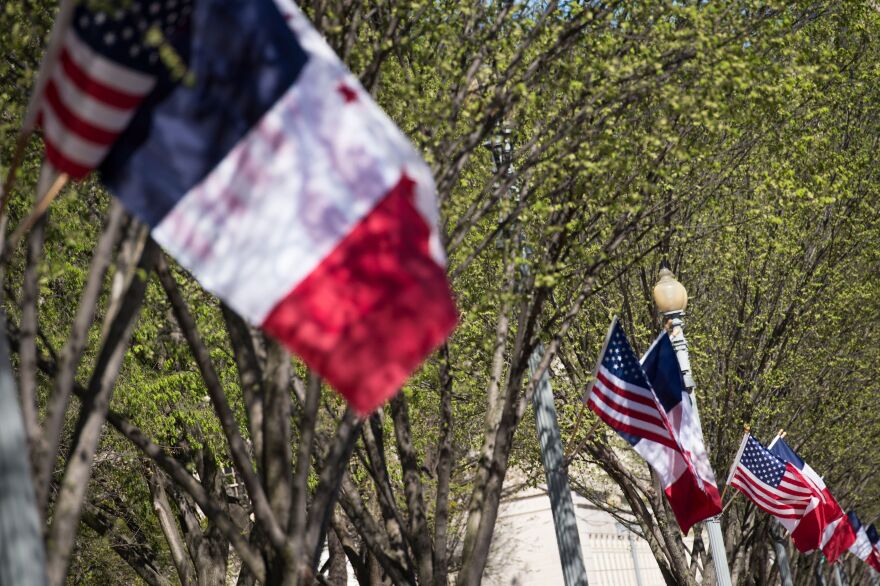President Trump will welcome French President Emmanuel Macron to the United States for an official state visit on Monday, in the latest sign of goodwill between the two leaders.
The two got off to a rocky start after sharing a tense handshake at their first meeting at a NATO summit in Brussels last May. But since that shaky beginning, Trump and Macron have developed a surprisingly collegial bond.
"It's no secret that President Trump and President Macron enjoy a good working relationship — I may say, a close personal relationship," a senior administration official told reporters at a briefing ahead of Macron's visit.
The strength of that bond may be tested during their talks this week, though. Macron is expected to press Trump for concessions on matters where the United States and France have not been aligned, including the U.S. military strategy in Syria, the Iran nuclear deal, and trade.
Until now, Trump and Macron have been able to mostly lay aside their differences and work together on important issues.
France joined the United States and Britain in carrying out airstrikes against the Syrian government earlier this month after a suspected chemical weapons attack.
But cracks in that united front were exposed shortly after those airstrikes took place, when Macron told French media that he had convinced Trump to keep U.S. troops in Syria.
The White House quickly pushed back, saying that the U.S. mission in Syria had not changed, and Trump still expects to bring U.S. troops stationed there home as quickly as possible.
Macron will likely try to get assurances from Trump during their discussions at the White House that the United States will not leave Syria until ISIS is fully defeated.
"The big question is whether the stylistic affinity and the camaraderie that the two presidents developed leads to actual substantive policy changes from Washington's point of view," said Jeffrey Rathke, who served as director of the State Department press office during the Obama administration.
Different in politics, similar in styles
Trump and Macron seem worlds apart politically — Macron is a centrist and pro-European Union, while Trump was elected on a populist "America First" platform.
Still, both men are outsiders who unexpectedly rose to their country's top office. They both have an appreciation for grandiose optics and work to present themselves as strong leaders.
Macron used their common styles to his advantage when he invited Trump to Paris last July, treating Trump and the first lady to dinner at the Eiffel Tower.
During that trip, Trump was guest of honor at the Bastille Day parade, where he made no attempt to conceal his excitement for the military show, pointing and gesturing at fighter jets as they flew by.
Trump and Macron even managed to make up for their first awkward encounter, exchanging a hug and sharing an extended, friendly handshake at the parade.
"They are two men who disrupted their political systems and two men who understood that politics was not responding to those disaffected by globalization," said Jeff Lightfoot, a fellow at the Atlantic Council, a Washington, D.C., think tank.
"I think there's a certain degree of mutual admiration there," Lightfoot said.
High-stakes meeting
Trump chose to honor Macron with the first state visit of the Trump administration. In addition to the pomp and pageantry of a state dinner, Trump will take Macron on a sightseeing trip to George Washington's Mount Vernon estate in Virginia.
The summit with the French president will give Trump an opportunity to showcase his diplomatic chops and his role as a statesman.

In some ways, the stakes may be higher for Macron than Trump because the French leader will need to show that his close relationship with Trump is producing some results, said Charles Kupchan of the Council on Foreign Relations.
"Trump is not popular on the other side of the Atlantic and people are going to ask him why he's bothering to spend time with American president, if he doesn't get anything to show for it," said Kupchan, who served as a director for European affairs on the National Security Council during the Obama and Clinton administrations.
One top priority for Macron will be making the case for the United States to stay in the Iran nuclear deal. Trump set a May 12 deadline to make a decision on whether to pull out of the agreement.
It will be a tough sell. Trump has been vocal about his disdain for the deal and his new national security adviser, John Bolton, and his pick for secretary of state, Mike Pompeo, are also not fans of the agreement.
Another looming deadline that will be up for discussion is the end of the current exemption for the European Union from U.S. import tariffs on steel and aluminum on May 1. Macron and the EU are advocating for a permanent exclusion from the duties.
Macron has "invested a lot in this relationship and it's not clear yet how much he's able to influence Donald Trump," Lightfoot said. "That's going to be a key question, I think, on this visit."
Copyright 2023 NPR. To see more, visit https://www.npr.org.



